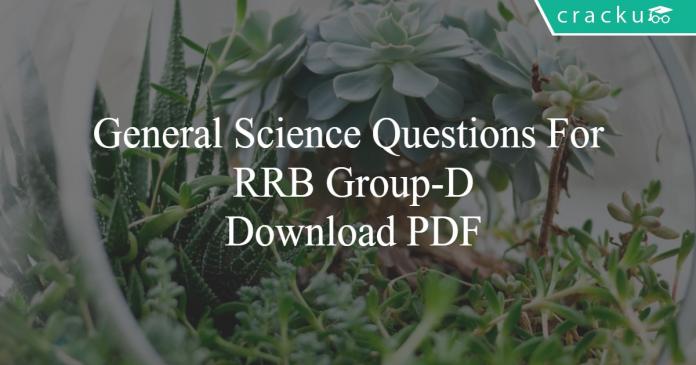RRB Group D General Science Questions PDF
Download Top 20 RRB Group-D General Science Questions and Answers PDF. RRB Group-D General Science questions based on asked questions in previous exam papers very important for the Railway Group-D exam.
Download RRB Group D General Science Questions PDF
Download RRB Group-D Previous Papers PDF
Take a RRB Group-D free mock test
Question 1: Which of the following is a metal?
a) Chlorine
b) Zinc
c) Neon
d) Iodine
e) Hydrogen
Question 2: Which of the following is a food crop?
a) Jute
b) Jatropa
c) Jowar
d) Cotton
e) Tobacco
Question 3: Which of the following is billionth of a second ?
a) Gigabyte
b) terabyte
c) Nanosecond
d) Microsecond
e) Terasecond
Question 4: Which is a natural colloid?
a) Urea
b) Cane-sugar
c) Blood
d) Sodium chloride
Question 5: Silicon is a polymer of
a) Silicon tetrachloride
b) Dialkyl dichloro silane
c) Silane
d) Tetraalkyl silane
Take a free mock test for RRB Group-D
Question 6: Alpha particle is the nucleus of an atom of
a) hydrogen
b) helium
c) oxygen
d) lthium
Question 7: The device used for measuring the wavelength of X-rays is
a) cyclotron
b) bragg spectrometer
c) mass spectrometer
d) GM counter
Question 8: The type of tail found in Shark is
a) homocercal
b) heterocercal
c) diphycercal
d) protocercal
Question 9: A narrow strip of land that connects two larger land masses is called
a) peninsula
b) cape
c) isthmus
d) strait
Question 10: The main factor which determines balance of nature is
a) human activities
b) Rabit and habitat
c) environmental conditions
d) availability of food
RRB Group D previous year papers
Question 11: The stability of a pond ecosystem depends on
a) micro-organisms and fishes
b) micro-organisms and zoo planktons
c) fishes and reptiles
d) producers and consumers
Question 12: Phenolics as pollutants can be removed from waste water by use of
a) Ion exchange resin technique
b) Electrolyte decomposition technique
c) Reverse osmosis method
d) Polymeric adsorbents
Question 13: A process which is not helpful in the prevention of rusting of iron is
a) annealing
b) applying grease
c) galvanising
d) painting
770 Mocks (cracku Pass) Just Rs.199
Question 14: Amides can be converted to amines by the reaction named
a) Perkin
b) Clasteration
c) Claisen
d) Clemmesen
Question 15: The following is a pseudo-force
a) Centrepetal force
b) Centrifugal reaction force
c) Centrifugal force
d) Strong nuclear force
Question 16: The soil salinity is measured by
a) Conductivity meter
b) Hygrometer
c) Psychrometer
d) Auxanometer
RRB Group-D Important Questions (download PDF)
Question 17: A form of condensation that reduces visibility and causes breathing problems is
a) Dew
b) Frost
c) Smog
d) Mist
Question 18: Lens is made up of
a) Pyrex glass
b) Flint glass
c) Ordinary glass
d) Cobalt glass
Question 19: The phenomenon of light associated with the appearance of blue colour of the sky is
a) Interference
b) Reflection
c) Refraction
d) Scattering
Question 20: Optical fibres are based on the phenomenon of
a) Interference
b) Dispersion
c) Diffraction
d) Total Internal Reflection
General Science Notes for RRB Exams (PDF)
Answers & Solutions:
1) Answer (B)
2) Answer (C)
3) Answer (C)
4) Answer (B)
5) Answer (A)
6) Answer (B)
7) Answer (B)
8) Answer (B)
9) Answer (C)
10) Answer (C)
11) Answer (D)
12) Answer (D)
13) Answer (A)
14) Answer (C)
15) Answer (C)
16) Answer (A)
17) Answer (C)
18) Answer (B)
19) Answer (D)
20) Answer (D)
DOWNLOAD APP FOR RRB FREE MOCKS
We hope this General Science Questions for RRB Group-D Exam will be highly useful for your preparation.





